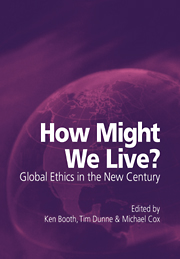Book contents
- Frontmatter
- Contents
- Notes on Contributors
- Acknowledgements
- Foreword
- Introduction: How Might We Live? Global Ethics in a New Century
- Individualism and the Concept of Gaia
- Bounded and Cosmopolitan Justice
- Globalization From Above: Actualizing The Ideal Through Law
- A More Perfect Union? The Liberal Peace and the Challenge of Globalization
- International Pluralism and the Rule of Law
- Towards a Feminist International Ethics
- Contested Globalization: The Changing Context and Normative Challenges
- Universalism and Difference in Discourses of Race
- Does Cosmopolitan Thinking Have a Future?
- Individuals, Communities and Human Rights
- Thinking About Civilizations
- Index
Thinking About Civilizations
Published online by Cambridge University Press: 04 August 2010
- Frontmatter
- Contents
- Notes on Contributors
- Acknowledgements
- Foreword
- Introduction: How Might We Live? Global Ethics in a New Century
- Individualism and the Concept of Gaia
- Bounded and Cosmopolitan Justice
- Globalization From Above: Actualizing The Ideal Through Law
- A More Perfect Union? The Liberal Peace and the Challenge of Globalization
- International Pluralism and the Rule of Law
- Towards a Feminist International Ethics
- Contested Globalization: The Changing Context and Normative Challenges
- Universalism and Difference in Discourses of Race
- Does Cosmopolitan Thinking Have a Future?
- Individuals, Communities and Human Rights
- Thinking About Civilizations
- Index
Summary
The word ‘civilization’—in the singular but also in the plural—has become common of late in the mouths of politicians and in the writings of international relations academics. Samuel Huntington stirred up a storm in political studies by his vision of the future world as a ‘clash’ of civilizations (in the plural); and the war in Yugoslavia generated an increased frequency in political rhetoric of the word ‘civilization’ (in the singular). Indeed, as I shall argue later, conflict in the Balkans revealed more clearly than before the meaning of civilizations and of civilization (in both plural and singular) for our time.
Most people do not think of themselves in the course of a normal day's activities as belonging to a civilization. Civilization is for most people pretty far down on the scale of self-conscious identities. And when politicians evoke civilization, it is usually when they want to arouse their constituents against some demonized enemy. The everyday manifestation of civilization is not in a feeling of belonging. It is in the almost unconscious, taken for granted, common senseis that expresses a people's shared idea of reality. This idea of reality also includes the sense of what is right and proper in ordinary behaviour. Common sense includes a normative guide to action as well as a perception of ‘objectivity’ (or what is really out there). I would argue that this common sense, which is different for people in different times and places, is shaped by a people's collective practical responses to their material conditions of existence.
- Type
- Chapter
- Information
- How Might We Live? Global Ethics in the New Century , pp. 217 - 234Publisher: Cambridge University PressPrint publication year: 2001
- 4
- Cited by



